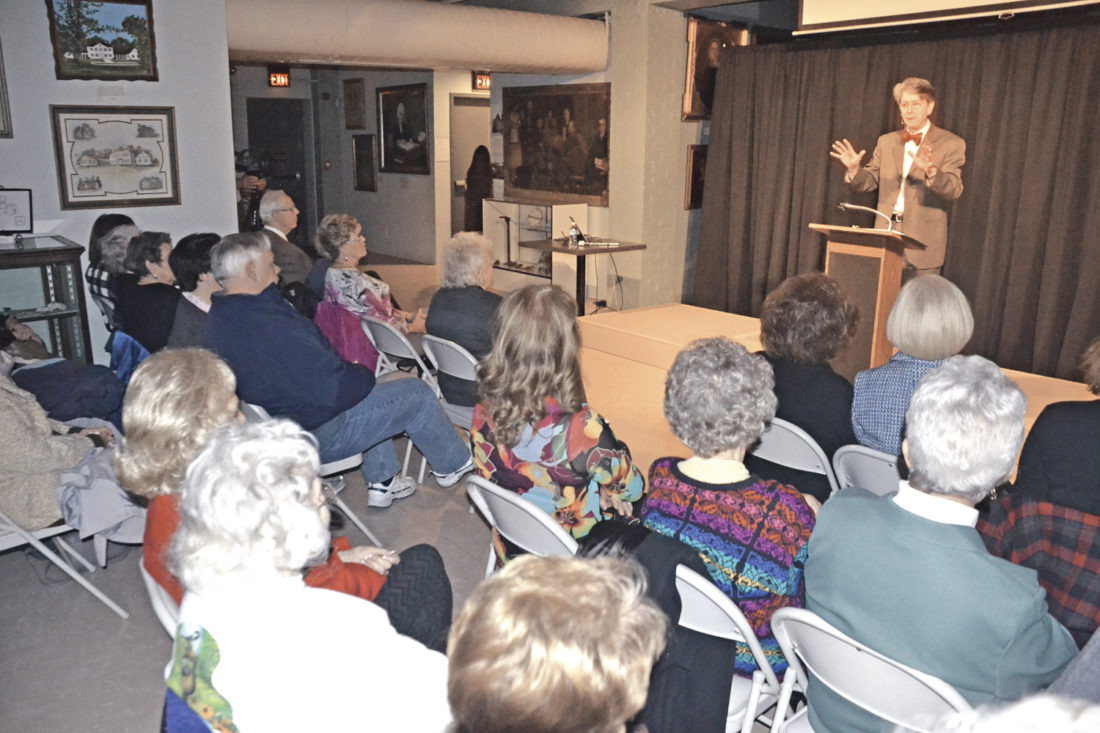By BRETT DUNLAP
The Parkersburg News and Sentinel
PARKERSBURG, W.Va. — The arts have a wide reach into the lives of so many different people and help them in ways that are not always clear, a composer and symphony conductor told people from around the community.

(Brett Dunlap photo)
The 2017 Blennerhassett Winter Lecture Series got underway Sunday with Maestro Grant Cooper, conductor of the West Virginia Symphony, presenting “A Portrait of the Artist As a Young Alien” at the Blennerhassett Museum of Regional History in downtown Parkersburg.
Cooper is wrapping up his time as the conductor of the West Virginia Symphony, a position he has held since 2001. He has conducted over 750 performances of that group. He will conduct his last concert with the symphony orchestra in Parkersburg at 3 p.m. March 19 at Blennerhassett Middle School.
Cooper was born and raised in New Zealand where he was involved in music all his life. He received a degree in mathematics. He came to the United States to study music and has since become a naturalized U.S. citizen.
Cooper said he had a hard time deciding what he should cover in his discussion Sunday.
Many people just want performers to perform and not talk about what they think of things going on in the world. In a way, many artists are aliens who see the world in a different way, Cooper said.
“Everything we see in the world is a question, not an answer,” he said. “Nothing is not what it seems and there is always more to glean from something than what might appear on the surface.
“When we think of life in general, I think we as artists really do approach it differently.”

(Photo by Brett Dunlap)
Immigrants and people from other countries are having trouble these days to make it in the U.S., even though many immigrants have helped benefit American society.
“As an immigrant myself, I am keenly aware of the ramifications of that,”Cooper said. “We do see ourselves contributing to American society.
“I am an American citizen and everything I say is from the heart.”
His experiences here come from his world view of his upbringing in New Zealand and through his work as a composer and conductor.
“I think you all can see an orchestra cooperating together,” he said of creating music. “Many would like to see society be like that where people to listen to each other and understand each other.”
He believes classrooms should use a more artistic approach in teaching students a variety of subjects. Cooper had a mathematics teacher who challenged students to solve different theorems where they would suggest different approaches, even though the teacher knew they were wrong, but he let them discover their own mistakes as they tried to work through it.
“As a class, we started to think of ourselves as being constructively involved in finding a solution,” Cooper said. “It gave us an incredible sense of power.
“It didn’t matter if we made a mistake, we would just cross it out and start over. There was nothing wrong with making a mistake.”
The students became invested in the outcome and applied themselves to solving it. People who just routinely do the calculations are not going to be the innovators and create the next advances in engineering, Cooper said.
“We need people who think creatively,” he said. “We need people immersed in another kind of experience, an artistic one perhaps, where they see themselves actively and imaginatively involved in the subject.”
He talked about being in classes with musicians where one really talented person among a group of talented people got everyone raising the quality of their own work, thus improving the group.
“Music gave me the opportunity to communicate,” Cooper said of his interaction with an audience.
Many arts programs are seeing their funding cut.
“We do this at our own peril,” Cooper said. “It is a very short sighted viewpoint that there is no value in the arts.
“That is unbelievable to me.”
Next week’s lecture will be Jarrod Burks presenting “Blennerhassett Island Archeology — Search for the Blockhouse and Other Recent Investigations Around the Mansion” at 2 p.m. Feb. 12 at the museum.
See more from The Parkersburg News and Sentinel





